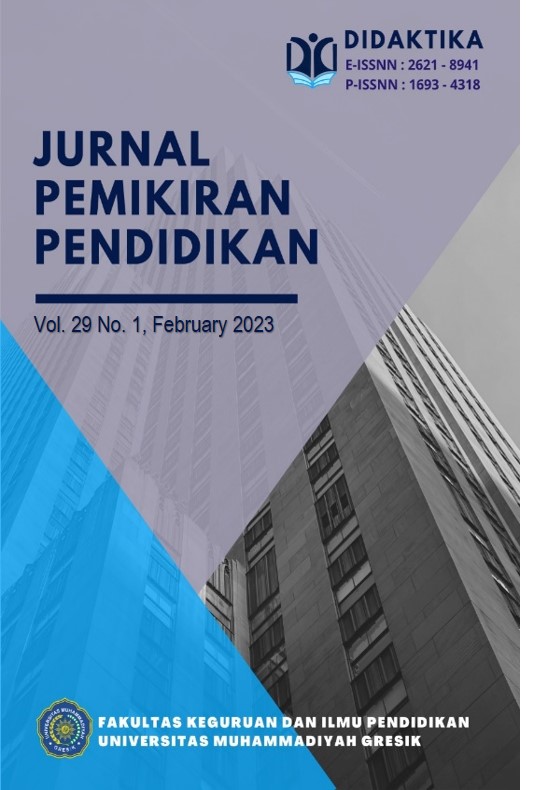M Pembelajaran AIK Multikultural di STKIP Muhammadiyah Kalabahi Kabupaten Alor Nusa Tenggara Timur
PEMBELAJARAN AIK MULTIKULTURAL DI STKIP MUHAMMADIYAH KALABAHI KABUPATEN ALOR NUSA TENGGARA TIMUR
DOI:
https://doi.org/10.30587/didaktika.v29i1.4330Keywords:
Kata kunci: STKIP Muhammadiyah Kalabahi, AIK dan Mahasiswa non MuslimAbstract
Abstrak
Penelitian ini bertujuan: 1) mendiskripsikan mebelajaran Al-Islam dan Kemuhammadiyahan khususnya untuk mahasiswa non-muslim; 2) mendiskripsikan respon mahasiswa terkait pembelajaran Al-Islam dan Kemuhammadiyahan. Jenis penelitian menggunakan penelitian studi lapangan dengan metode penelitiannya adalah penelitian deskriptif kualitatif. Pengumpulan data dilakukan melalui observasi dan wawancara. Teknik analisis data menggunakan analisis data interaktif model Milles dan Huberman. Kesimpulannya menunjukkan bahwa STKIP Muhammadiyah Kalabahi masih menerapkan Kurikulum pembelajaran AIK yang dikeluarkan oleh PP Litbang Dikti Muhammadiyah tahun 2013, Pembahasan AIK lebih didekatkan dengan konteks (sosial dan budaya) kehidupan mahasiswa, sehingga mahasiswa mengenal dan memahami Islam dan Muhammadiyah secara lebih akrab yang diterima oleh nalar sosial dan budaya mereka. Teknik Pembelajaran AIK I (Kemanusiaan dan Keimanan), AIK II (Ibadah, Akhlak dan Muamalah). AIK III (Kemuhammadiyahan), AIK IV (Islam dan Ilmu Pengetahuan).
Kata kunci: STKIP Muhammadiyah Kalabahi, AIK dan Mahasiswa non Muslim
Abstract
This study aims to: 1) describe the study of Al-Islam and Kemuhammadiyahan, especially for non-Muslim students; 2) describe students' responses related to learning Al-Islam and Kemuhammadiyahan. This type of research uses field study research with the research method is qualitative descriptive research. Data collection was carried out through observation and interviews. The data analysis technique uses interactive data analysis of Milles and Huberman's model. His conclusion shows that STKIP Muhammadiyah Kalabahi is still implementing the AIK learning curriculum issued by the Muhammadiyah Higher Education Research and Development Regulation in 2013, the AIK discussion is closer to the context (social and cultural) of student life, so that students know and understand Islam and Muhammadiyah more intimately which are accepted by their social and cultural reasoning. Learning Techniques AIK I (Humanity and Faith), AIK II (Worship, Morals and Muamalah). AIK III (Kemuhammadiyahan), AIK IV (Islam and Science).
References
Djunaidi & Fauzan. 2014. Metode Penelitian Kualitatif.
Majelis Diktilitbang Pimpinan Pusat Muhammadiyah. 2019. Materi Rakornas Pimpinsn Perguruan Tinggi Muhammadiyah- Aisyiyah Jogjakarta Istimewa.
Majelis pendidikan Tinggi Pimpinan Pusat Muhammadiyah. 2013. Pedoman Pendidikan AIK AlIslam Dan Kemuhammadiyahan Perguruan Tinggi Muhammadiyah.
Downloads
Published
How to Cite
Issue
Section
License
License and Copyright Agreement
In submitting the manuscript to the journal, the authors certify that:
- They are authorized by their co-authors to enter into these arrangements.
- The work described has not been formally published before, except in the form of an abstract or as part of a published lecture, review, thesis, or overlay journal.
- That it is not under consideration for publication elsewhere,
- That its publication has been approved by all the author(s) and by the responsible authorities – tacitly or explicitly – of the institutes where the work has been carried out.
- They secure the right to reproduce any material that has already been published or copyrighted elsewhere.
- They agree to the following license and copyright agreement.
Copyright
Authors who publish with DIDAKTIKA: Jurnal Pemikiran Pendidikan agree to the following terms:
- Authors retain copyright and grant the journal right of first publication with the work simultaneously licensed under a Creative Commons Attribution License (CC BY-SA 4.0) that allows others to share the work with an acknowledgment of the work's authorship and initial publication in this journal.
- Authors are able to enter into separate, additional contractual arrangements for the non-exclusive distribution of the journal's published version of the work (e.g., post it to an institutional repository or publish it in a book), with an acknowledgment of its initial publication in this journal.
- Authors are permitted and encouraged to post their work online (e.g., in institutional repositories or on their website) prior to and during the submission process, as it can lead to productive exchanges, as well as earlier and greater citation of published work.
Licensing for Data Publication
Open Data and Software Publishing and Sharing
The journal strives to maximize the replicability of the research published in it. Authors are thus required to share all data, code or protocols underlying the research reported in their articles. Exceptions are permitted but have to be justified in a written public statement accompanying the article.
Datasets and software should be deposited and permanently archived inappropriate, trusted, general, or domain-specific repositories (please consult http://service.re3data.org and/or software repositories such as GitHub, GitLab, Bioinformatics.org, or equivalent). The associated persistent identifiers (e.g. DOI, or others) of the dataset(s) must be included in the data or software resources section of the article. Reference(s) to datasets and software should also be included in the reference list of the article with DOIs (where available). Where no domain-specific data repository exists, authors should deposit their datasets in a general repository such as ZENODO, Dryad, Dataverse, or others.
Small data may also be published as data files or packages supplementary to a research article, however, the authors should prefer in all cases a deposition in data repositories.











